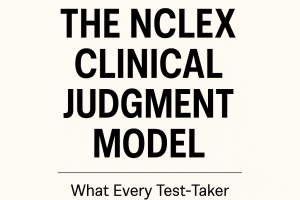How to Identify and Eliminate Your Weakest NCLEX Subjects

Passing the NCLEX isn’t just about studying hard—it’s about studying smart. That means focusing on your weakest areas, not just the ones you like or find easy.
Many students make the mistake of going over topics they already know, avoiding the tough ones out of frustration or fear. But to truly get NCLEX-ready, you must identify, confront, and master your weak spots.
Here’s a step-by-step strategy to help you do just that.
Step 1: Take a Full NCLEX Diagnostic Practice Test
The first step to identifying your weakest subjects is data. A full-length NCLEX practice exam provides a snapshot of your performance across all test categories.
What to look for:
- Which Client Needs category are you struggling with?
- Safe and Effective Care Environment
- Health Promotion and Maintenance
- Psychosocial Integrity
- Physiological Integrity
- Which topics consistently lower your score?
- Pharmacology
- Management of Care
- Infection Control
- Mental Health
- Maternity, etc.
Choose a test that provides detailed analytics and a breakdown of your score by category.
Step 2: Track Patterns Over Time
One test isn’t enough. Your weakest areas will show themselves consistently across multiple practice exams and quizzes.
Create a simple tracking spreadsheet or journal:
- Date
- Exam type
- Section scores
- Topic with lowest percentage
- Notes on common mistakes
After 3–5 quizzes, you’ll start to see patterns. That’s your signal.
Step 3: Ask Yourself the Right Questions
Once you identify the topics you’re weakest in, go deeper:
- Do I lack content knowledge in this area?
- Do I understand the concepts but struggle with application questions?
- Do I freeze up when this subject appears?
- Do I miss key words or fall for traps in these questions?
Understanding why you’re weak in a subject helps you choose the right strategy to fix it.
Step 4: Create a Targeted Study Plan
Now that you know where you’re struggling, it’s time to flip the script. Devote extra time each week to mastering your weakest subject.
For Example:
If your weakness is Pharmacology, your weekly plan might look like:
- Day 1–2: Review drug classes and key side effects
- Day 3: Watch visual lectures or flashcard reviews
- Day 4: Practice 25–50 Pharm NCLEX-style questions
- Day 5: Revisit missed questions, study rationales
- Day 6: Take a mini Pharm quiz and track improvement
The key is active review, not passive reading.
Step 5: Practice Questions by Topic (and Rationale Review)
Use NCLEX question banks (UWorld, Archer, etc.) to target specific subjects. For each session:
- Focus on one weak topic
- Answer 20–40 questions
- Read the rationale, even if you got the question right
- Note down common traps and test-taking errors
You should start to notice better retention and faster recall.
Step 6: Reinforce with Visual and Hands-On Tools
Some weak areas improve faster with multi-sensory learning:
- Use color-coded notes and flashcards
- Watch short explainer videos
- Teach the topic to a study buddy or record yourself summarizing it
- Use mnemonics or acronyms to lock in tricky facts
When your brain engages with information in more than one way, learning sticks.
Step 7: Reassess Every 2 Weeks
You won’t know you’re improving unless you test yourself again. Every two weeks:
- Take a 60–75 question test focused on your weak areas
- Compare scores from your last assessment
- Identify new trends or problem areas
As you progress, your “weak subjects” will start to become your strongest ones.
Bonus Tips:
- Don’t ignore mental blocks. If you’re avoiding a topic like Mental Health or Pharmacology, face it head-on. Avoidance slows progress.
- Balance weak and strong topics. Continue reviewing your strengths to maintain them, but spend more time on weaker areas.
- Use tools that offer rationales. Understanding why an answer is right or wrong makes all the difference.
Final Thoughts
You don’t need to be perfect in every NCLEX subject. But you do need to be safe, confident, and consistent. That comes from targeted preparation.
Identifying and eliminating your weak NCLEX subjects is like plugging leaks in your boat before you set sail—you’ll move faster, more confidently, and be ready for anything the exam throws your way.






